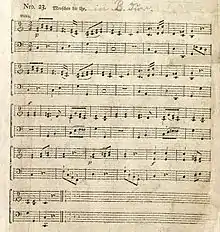Menschen, die ihr wart verloren
"Menschen, die ihr wart verloren" (German, literally: Humans, you who were lost) is a German Christmas carol. It was originally written by the Catholic priest Christoph Bernhard Verspoell, both the text in ten stanzas and the ![]() melody . It became part of several regional versions of the Catholic hymnal Gotteslob in 1975,[1] but was included in the common section (Stammteil) in the current Gotteslob in 2013, as GL 245 in four stanzas, the former stanzas 1, 5, 8 and 9.
melody . It became part of several regional versions of the Catholic hymnal Gotteslob in 1975,[1] but was included in the common section (Stammteil) in the current Gotteslob in 2013, as GL 245 in four stanzas, the former stanzas 1, 5, 8 and 9.

The first stanza addresses humans who were lost, telling them to live up and be joyful, because God became equal to men ("den Menschen gleich"). The refrain calls them to give thanks by singing "Glory to God in the highest", alluding to the Annunciation. The second stanza reflects the mystery of the Creator as a helpless child, the third stanza names love as the reason for this act, and the final stanza calls to love him in return.
|
Menschen, die ihr wart verloren, |
O ye men, once in perdition, |
Melody
Source: Text and melody: Christoph Bernhard Verspoell, Münster 1810.
Heinrich Fidelis Müller composed a different melody when he included Verspoell's text in his Christmas oratorio Weihnachtsoratorium, Op. 5.
References
- GL 843 (Aachen), 878 (Berlin), 805 (Dresden-Meissen/Erfurt/Görlitz/Magdeburg), 821 (Essen), 801 (Fulda), 845 (Hamburg), 843 (Köln), 908 (Münster), 850 (Osnabrück), 834 (Paderborn), 809 (Trier), 950 (Würzburg)
External links
| Wikimedia Commons has media related to Menschen, die ihr wart verloren. |